Mental health workshop in Ukraine

How can we have an action in mental health useful to people living in Ukraine, based on local knowledge and combining the complementarity of 2 European foundations ?
- psychologists and psychotherapists from Ukraine and abroad,
- regional coordination of the national All-Ukrainian Mental Health program,
- local civil society associations Carpathian Foundation and World to Ukrainians,
- European foundations : Robert Bosch Stiftung, F4U, Fondation de France,
- the German international cooperation agency.


A consensus has emerged around psychoeducation, strengthening social ties and digital platforms, for which a next step will define the operating methods, thus adding to the others mental health actions of the Fondation de France Ukraine Solidarity Committee.


Mental health workshop in Ukraine

How can we have an action in mental health useful to people living in Ukraine, based on local knowledge and combining the complementarity of 2 European foundations ?
- psychologists and psychotherapists from Ukraine and abroad,
- regional coordination of the national All-Ukrainian Mental Health program,
- local civil society associations Carpathian Foundation and World to Ukrainians,
- European foundations : Robert Bosch Stiftung, F4U, Fondation de France,
- the German international cooperation agency.


A consensus has emerged around psychoeducation, strengthening social ties and digital platforms, for which a next step will define the operating methods, thus adding to the others mental health actions of the Fondation de France Ukraine Solidarity Committee.


Lecture at the Institute of International Humanitarian Studies in Aix-en-Provence

From 09 to 11 December 2024, I had the pleasure of presenting the fundamentals of mental health and the psychosocial treatment of psychological trauma to students at the Institute of International Humanitarian Studies and the Aix Global Justice – Doctoral Clinic in International Human Rights Law, part of the Faculty of Law at Aix-Marseille University :
- Mental health and public policies in mental health: definition and bio-psycho-social approach, mental health needs in developing countries, public policies in mental health,
- Psychotrauma and its psychosocial treatment: psychotrauma, psychosocial programmes, psychosocial and psychotherapeutic systems, culture and measuring impact, with practical case studies on integrating mental health into a project.

The richness of the discussions throughout the course confirmed both the spontaneous interest of the students in mental health and the relevance of this subject for this course, given that the institutions’ dealings with asylum seekers do not take sufficient account of this clinic of exile.
Lecture at the Institute of Humanitarian Studies in Aix-en-Provence
From 09 to 11 December, I had the pleasure of presenting the fundamentals of mental health and the psychosocial treatment of psychological trauma to students at the Institute of International Humanitarian Studies and the Aix Global Justice – Doctoral Clinic in International Human Rights Law, part of the Faculty of Law at Aix-Marseille University :
- Mental health and public policies in mental health: Definition and bio-psycho-social approach, Mental health needs in developing countries, Public policies in mental health,
- Psychotrauma and its psychosocial treatment: psychotrauma, psychosocial programmes, psychosocial and psychotherapeutic systems, culture and measuring impact, with practical case studies on integrating mental health into a project.

The richness of the discussions throughout the course confirmed both the spontaneous interest of the students in mental health and the relevance of this subject for this course, given that the institutions’ dealings with asylum seekers do not take sufficient account of this clinic of exile.

Development french agency
mental health day event
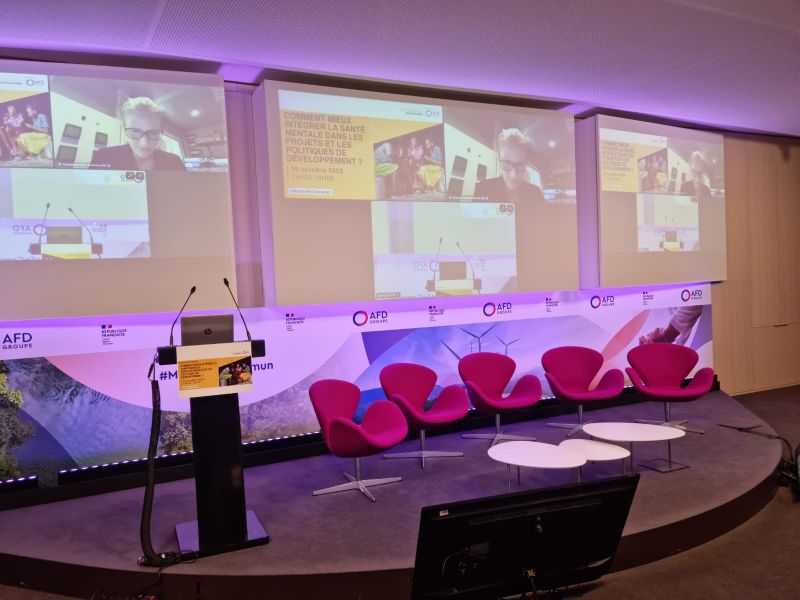
- Beyond crises: adopting a cross-disciplinary approach to mental health : Virginie Lefèvre (Amel), Laurent Kasindi (Search for Common Ground), Véronique Petit (IRD);
- Adapting mental health responses to the specific needs of different target groups: Nawel Boumediene and Rhoda Kambamba (Pierre Fabre Foundation), Laetitia Clouin (Action against hunger), Violaine Gagnet (Plan International), Anne-Cécile Violland (National French assembly);
- Disseminating a mental health culture in developing countries : Bénédicte Goudet (Bluemind Foundation), Aurelie Gal-Regniez (Equipop), Soundio Idrissa Coulibaly (Handicap International – Humanity & Inclusion);
- Integrating mental health more fully into public policies for the complete well-being of populations: Rabih Chammay (MHNP Lebanon), Viviane Kovess-Masfety (Columbia University), Jean Luc Roelandt (EPSM Lille-Métropole), Ida Andersen (International Committee of the Red Cross – ICRC).
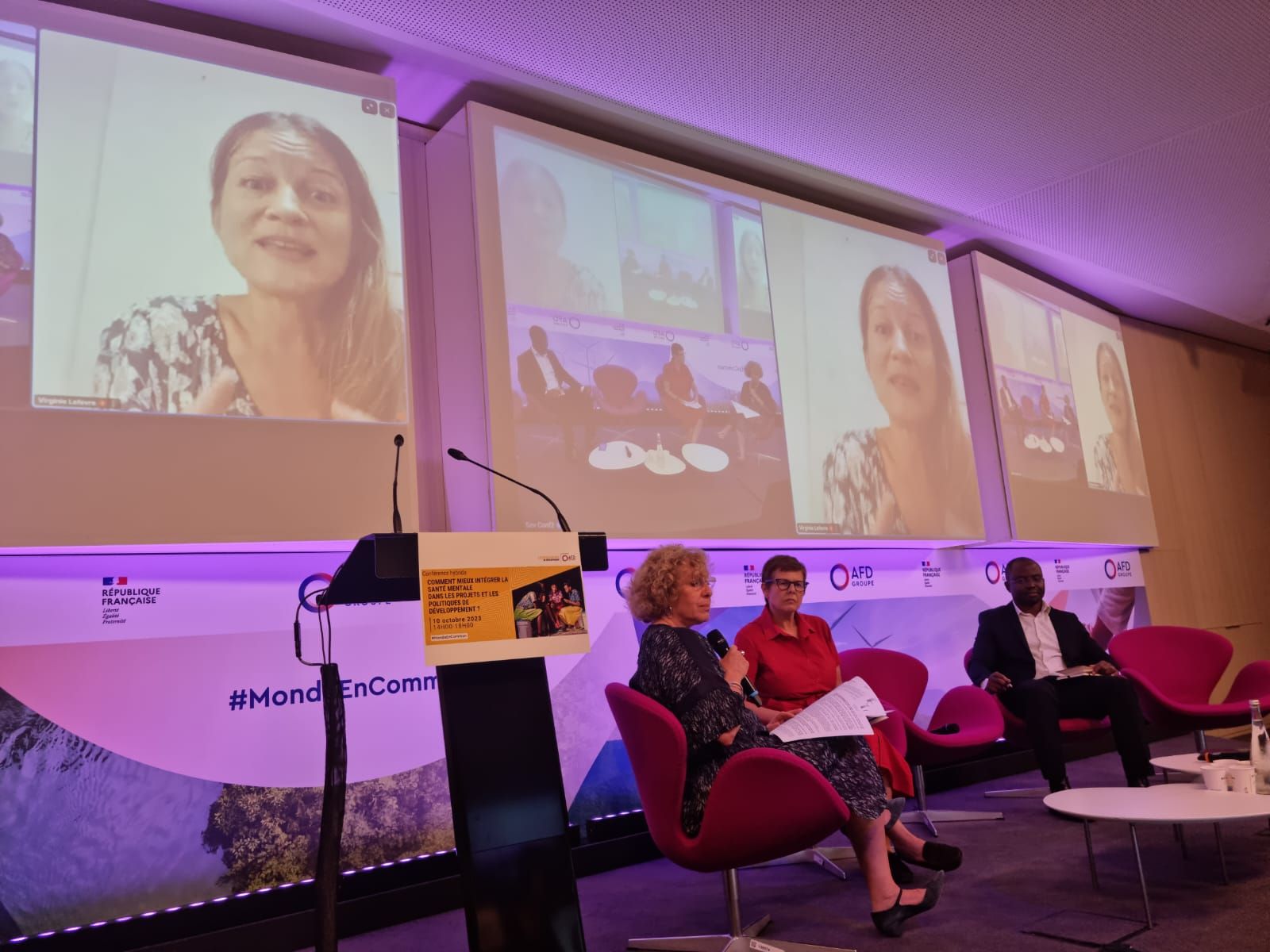
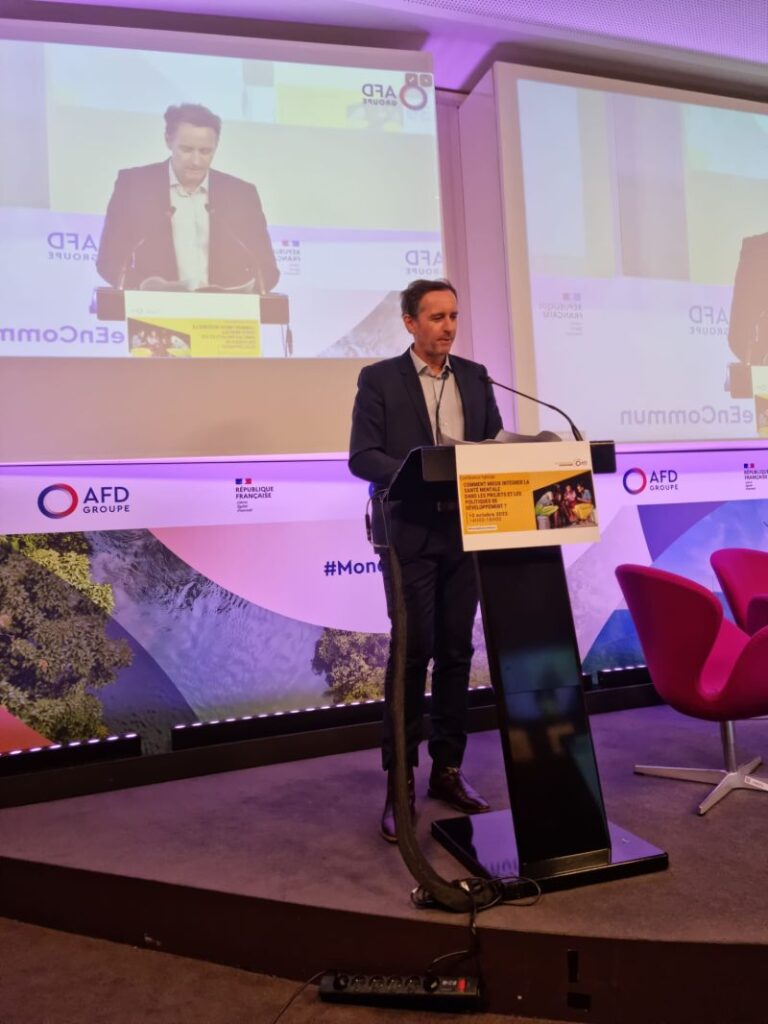
- a cross-cutting issue, permeating people’s lives in all their different spheres,
- a theme that transcends its primary focus, through the bidirectional link between poverty and poor mental health, but also by being a factor in social cohesion and peacekeeping,
- a practice that is easily accessible as long as the will, particularly the political will, is there.
- based on a holistic approach to people’s needs
- prevention, not just cure,
- which should be integrated with primary health care.
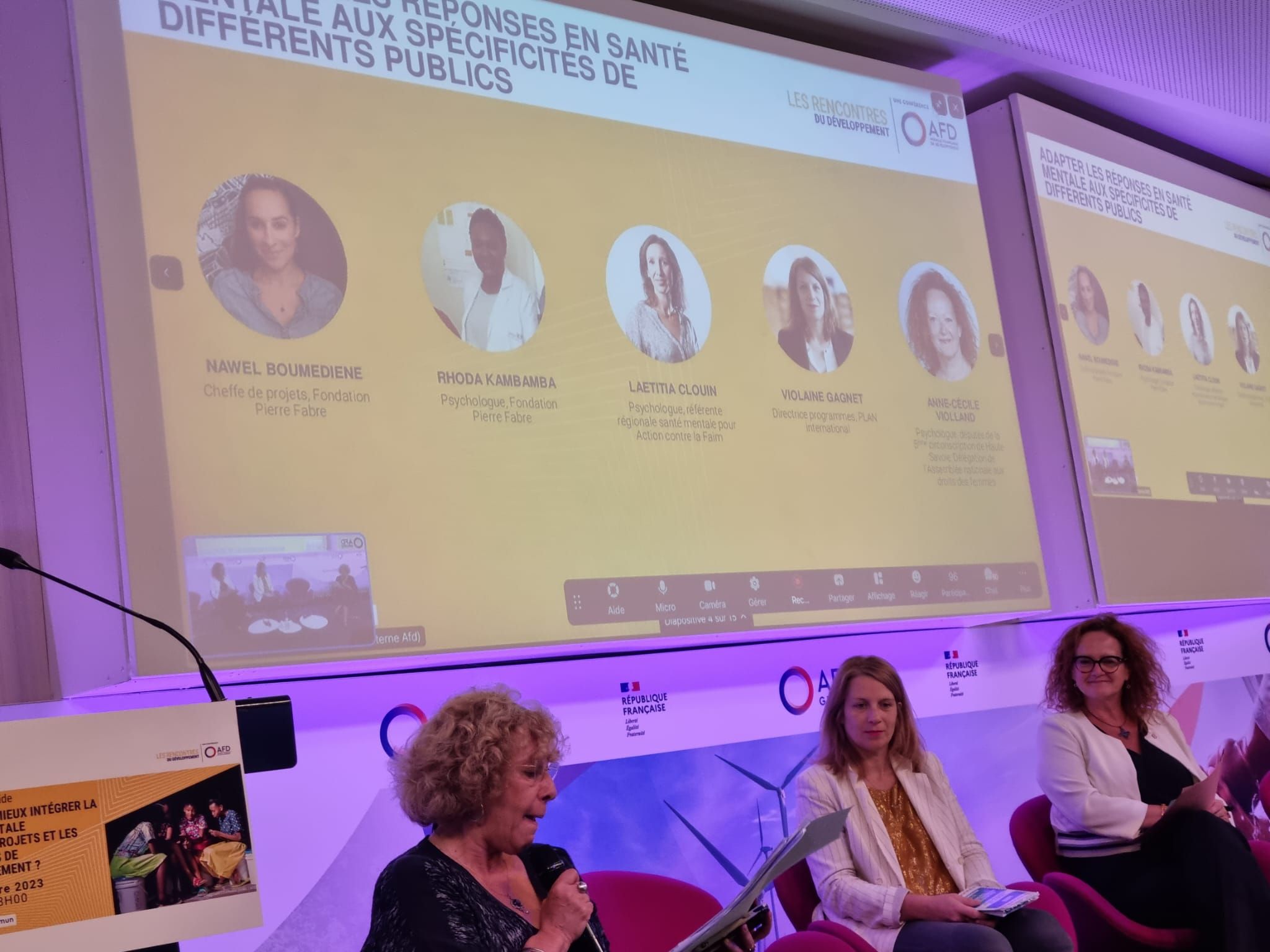
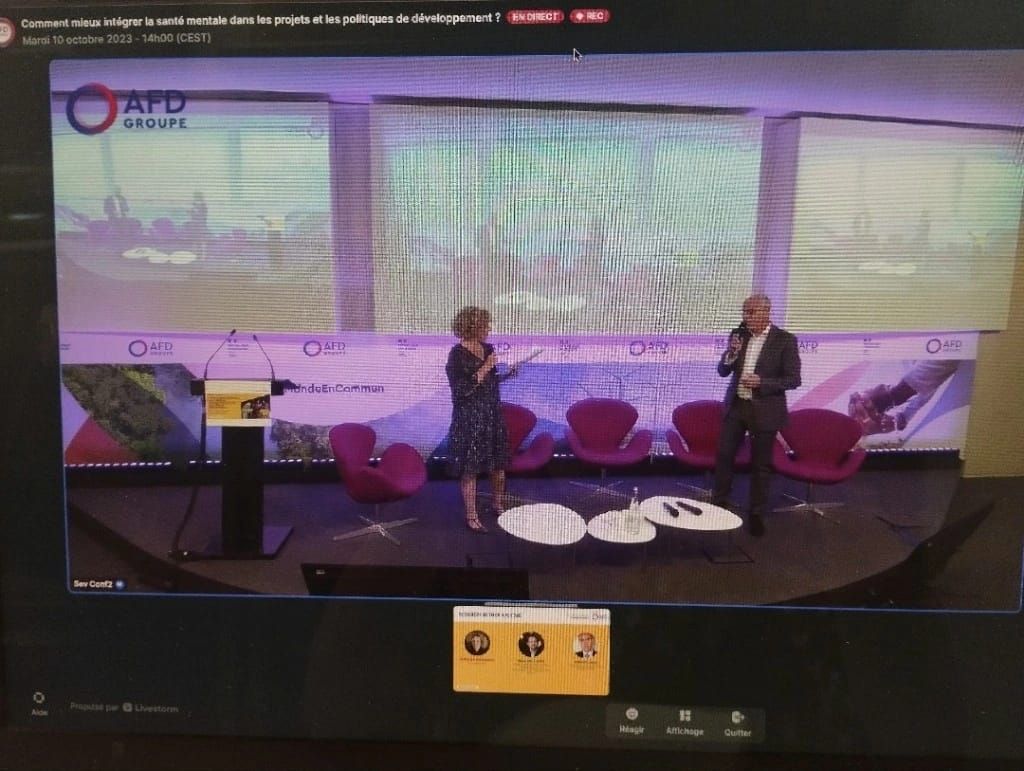
- “We had prepared the social, but we hadn’t prepared the invisible” (Laurent Kasindi)
- “Women’s mental health requires the deconstruction of gender stereotypes” (Anne-Cécile Violland)
- “Youth, poverty and mental health form an inseparable triangle” (Virginie Lefevre) .
- “There can be no good health without mental health” (Ida Andersen).
The replay and resources are available on the event page of the AFD website.
Development french agency mental health day event

- Beyond crises: adopting a cross-disciplinary approach to mental health : Virginie Lefèvre (Amel), Laurent Kasindi (Search for Common Ground), Véronique Petit (IRD);
- Adapting mental health responses to the specific needs of different target groups: Nawel Boumediene and Rhoda Kambamba (Pierre Fabre Foundation), Laetitia Clouin (Action against hunger), Violaine Gagnet (Plan International), Anne-Cécile Violland (National French assembly);
- Disseminating a mental health culture in developing countries : Bénédicte Goudet (Bluemind Foundation), Aurelie Gal-Regniez (Equipop), Soundio Idrissa Coulibaly (Handicap International – Humanity & Inclusion);
- Integrating mental health more fully into public policies for the complete well-being of populations: Rabih Chammay (MHNP Lebanon), Viviane Kovess-Masfety (Columbia University), Jean Luc Roelandt (EPSM Lille-Métropole – GHT Psy NPdC), Ida Andersen (International Committee of the Red Cross – ICRC).

- a cross-cutting issue, permeating people’s lives in all their different spheres,
- a theme that transcends its primary focus, through the bidirectional link between poverty and poor mental health, but also by being a factor in social cohesion and peacekeeping,
- a practice that is easily accessible as long as the will, particularly the political will, is there.
- based on a holistic approach to people’s needs
- prevention, not just cure,
- which should be integrated with primary health care.

- “We had prepared the social, but we hadn’t prepared the invisible” (Laurent Kasindi)
- “Women’s mental health requires the deconstruction of gender stereotypes” (Anne-Cécile Violland)
- “Youth, poverty and mental health form an inseparable triangle” (Virginie Lefevre) .
- “There can be no good health without mental health” (Ida Andersen).
The replay and resources are available on the event page of the AFD website.
Mental health and stress management
on day to day and crisis situations training
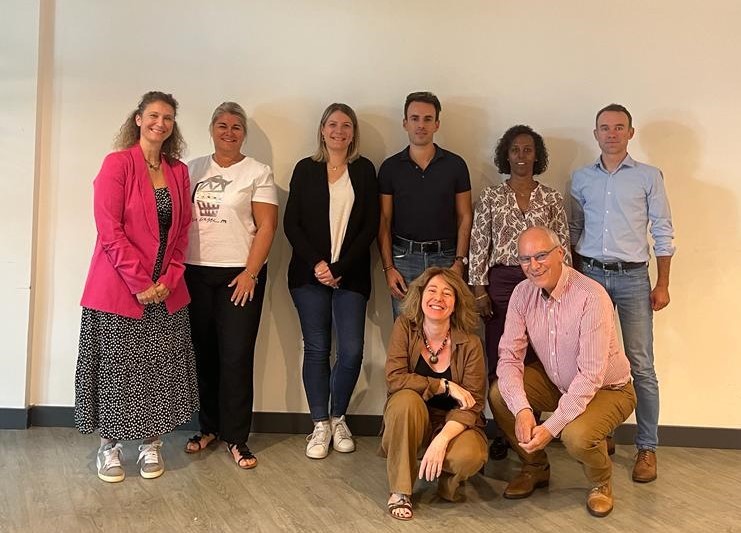
How can we detect situations of physical, psychological and emotional fatigue or distress among international volunteers during their expatriation or among team members during their assignments? How do you adopt the right dialogue to respond to the various problems?
In the event of an external crisis (e.g. an explosion Beirut’s port, a rebellion, etc.), what attitude should we adopt and what information should we request or pass on without increasing the stress of the person on the spot?
In the two cases mentioned above, what attitudes and behaviours should be put in place to avoid being emotionally overloaded?

These were the terms of the training course that the Government of Monaco’s International Cooperation Department (ICD) asked me to design and run for the team in charge of monitoring Monaco’s International Volunteers and the H24 hotline.
- the different approaches to stress;
- the signals that indicate different stress situations, including the suicidal dimension;
- the different types of response that can be made, both externally (active listening) and internally (physical, cognitive and emotional responses);
- potentially traumatic events, risk factors and protective factors;
- stress states, their symptoms, the different neurological and emotional mechanisms, and post-traumatic stress;
- attitudes to acute stress and post-immediate management;
- the different methods of self-protection.
For each section, situational scenarios and role-playing exercises were used to help the trainees better grasp the material.
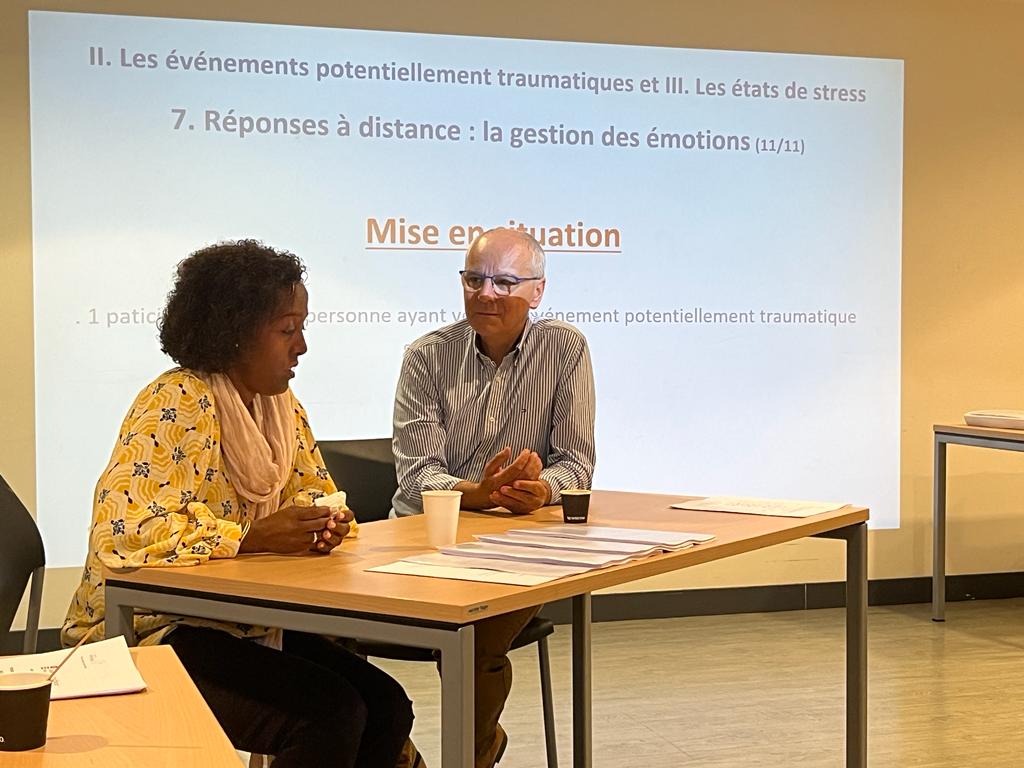
The success of this training course was largely due to the human qualities and involvement of the ICD team, whom I would like to thank sincerely for their trust and for the quality of our relationship, both during the training course and in our work in general.
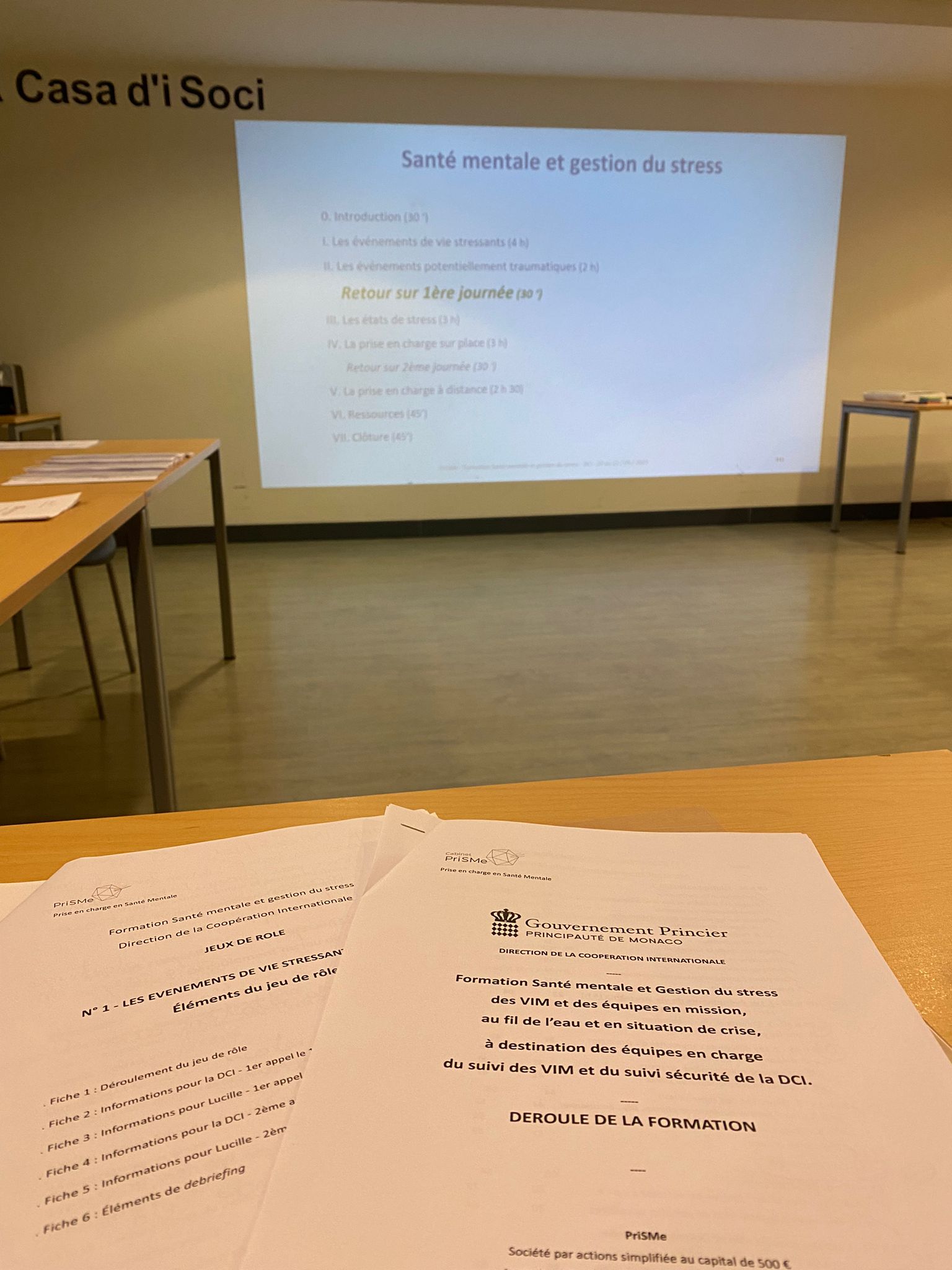
Mental health and stress management on day to day and crisis situations training

How can we detect situations of physical, psychological and emotional fatigue or distress among international volunteers during their expatriation or among team members during their assignments? How do you adopt the right dialogue to respond to the various problems?
In the event of an external crisis (e.g. an explosion Beirut’s port, a rebellion, etc.), what attitude should we adopt and what information should we request or pass on without increasing the stress of the person on the spot?
In the two cases mentioned above, what attitudes and behaviours should be put in place to avoid being emotionally overloaded?

These were the terms of the training course that the Government of Monaco’s International Cooperation Department (ICD) asked me to design and run for the team in charge of monitoring Monaco’s International Volunteers and the H24 hotline.
- the different approaches to stress;
- the signals that indicate different stress situations, including the suicidal dimension;
- the different types of response that can be made, both externally (active listening) and internally (physical, cognitive and emotional responses);
- potentially traumatic events, risk factors and protective factors;
- stress states, their symptoms, the different neurological and emotional mechanisms, and post-traumatic stress;
- attitudes to acute stress and post-immediate management;
- the different methods of self-protection.
For each section, situational scenarios and role-playing exercises were used to help the trainees better grasp the material.

The success of this training course was largely due to the human qualities and involvement of the ICD team, whom I would like to thank sincerely for their trust and for the quality of our relationship, both during the training course and in our work in general.

2nd strategic seminar
and trip to Ukraine
for the Fondation de France's Ukraine Solidarity Committee

An active summer for the Fondation de France’s Ukraine Solidarity Committee, with
- the 2nd strategic seminar in June in the western suburbs of Paris;
- a trip to Ukraine in July, for a 2-day workshop in Oujgorod with the partners behind the projects supported, followed by a visit to projects run by local structures in various parts of Transcarpathia.

The seminar provided an opportunity to put the Committee’s strategy in the face of the evolving crisis in Ukraine into perspective, taking into account the various parameters of an ongoing conflict, dwindling resources, the ever-increasing needs of the population and the need to support local players over the long term.
The Oujgorod workshop provided an opportunity to meet a civil society that feels strong and optimistic. The post-Maidan thirties people, most of whom are well educated, say they have learnt over the last ten years how to manage crises, while being aware of the shifting security context and the prospect of a general mobilisation.

In addition to the energy displayed, psychological fatigue is a reality, whether as a result of the action carried out over the course of the year, the uncertainty of each moment for partners who had come from Kiev or Lviv, or concern for a family member on the front line.
It emerged from the various discussions, with resource persons during the seminar and with participants during the workshop, that mental health is a cross-cutting issue, with a significant need in all areas. In response, several actions need to be pursued or considered:
- Development of psycho-education, to enable people to understand their symptoms and give them the means to regulate them and live with them as much as possible;
- A psychosocial approach, aimed at a co-constructed approach to care that combines psychological aspects and social factors;
- Training practitioners in psycho-trauma and EMDR;
- Setting up mental health projects aimed at CSO teams;
- Supporting networking between psychologists and enabling the development of a network through a practice analysis group.

2nd strategic seminar and trip to Ukraine for the Fondation de France's Ukraine Solidarity Committee

An active summer for the Fondation de France’s Ukraine Solidarity Committee, with
- the 2nd strategic seminar in June in the western suburbs of Paris;
- a trip to Ukraine in July, for a 2-day workshop in Oujgorod with the partners behind the projects supported, followed by a visit to projects run by local structures in various parts of Transcarpathia.

The seminar provided an opportunity to put the Committee’s strategy in the face of the evolving crisis in Ukraine into perspective, taking into account the various parameters of an ongoing conflict, dwindling resources, the ever-increasing needs of the population and the need to support local players over the long term.
The Oujgorod workshop provided an opportunity to meet a civil society that feels strong and optimistic. The post-Maidan thirties people, most of whom are well educated, say they have learnt over the last ten years how to manage crises, while being aware of the shifting security context and the prospect of a general mobilisation.

In addition to the energy displayed, psychological fatigue is a reality, whether as a result of the action carried out over the course of the year, the uncertainty of each moment for partners who had come from Kiev or Lviv, or concern for a family member on the front line.
It emerged from the various discussions, with resource persons during the seminar and with participants during the workshop, that mental health is a cross-cutting issue, with a significant need in all areas. In response, several actions need to be pursued or considered:
- Development of psycho-education, to enable people to understand their symptoms and give them the means to regulate them and live with them as much as possible;
- A psychosocial approach, aimed at a co-constructed approach to care that combines psychological aspects and social factors;
- Training practitioners in psycho-trauma and EMDR;
- Setting up mental health projects aimed at CSO teams;
- Supporting networking between psychologists and enabling the development of a network through a practice analysis group.

Mental Health First Aid training
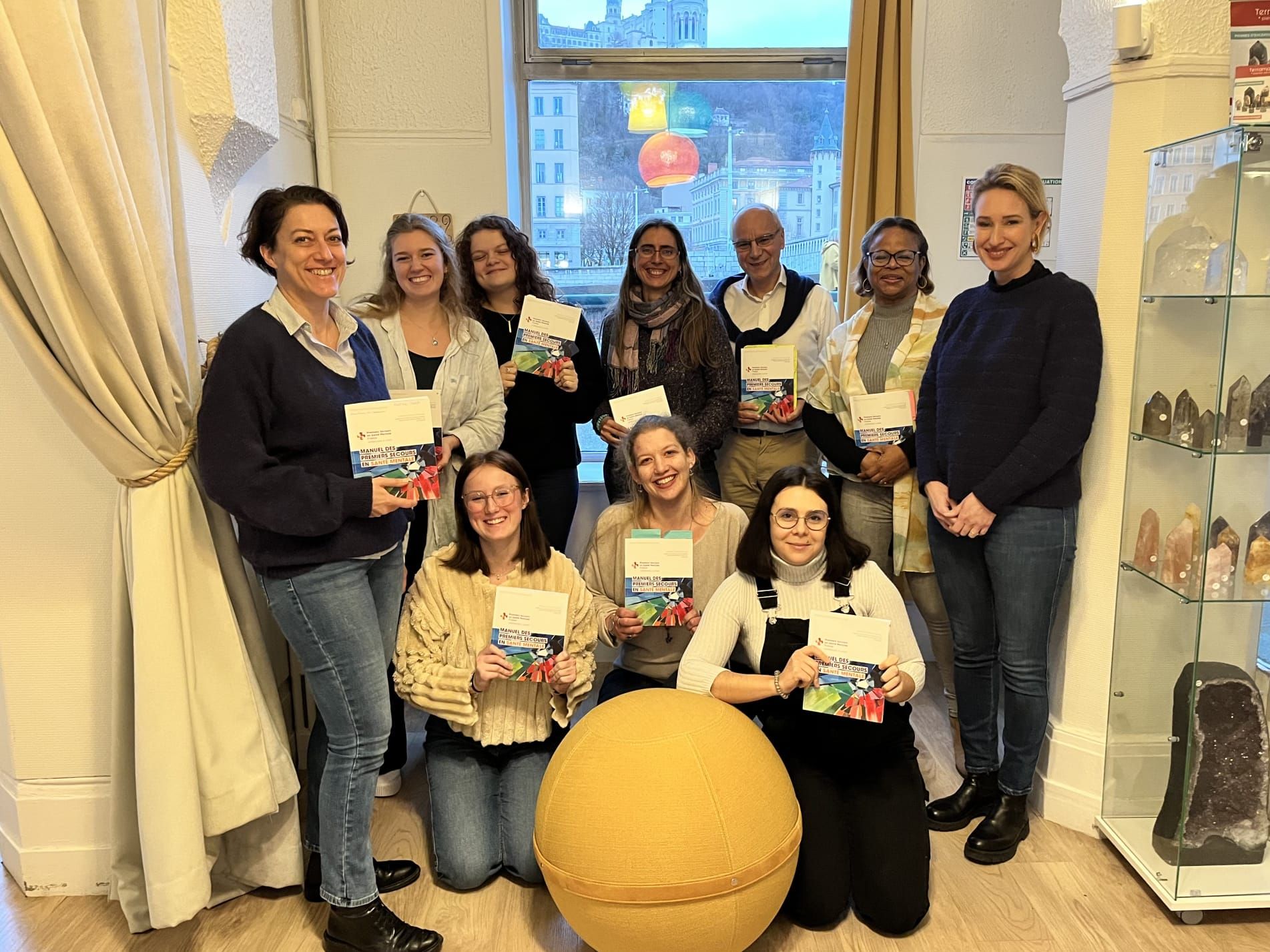
If I say first-aider, who comes to mind? Probably firefighters, sea and mountain rescuers, paramedics, natural disaster responders, and many others.
And for the mind, who comes to mind? If you can’t see, then it could be you.
Because when faced with a relative, friend or colleague, one sentence can make a difference, can save a life. Reaching out with simple words like “I’m worried about you. I’m here if you want to talk about it” can open a door, rekindle trust, recreate a bond, and get someone to talk about the source of their malaise and the ideas, sometimes very dark, that this has created within them. However, when faced with situations in which they perceive the other person to be unwell, people are often at a loss and at best don’t know how to deal with it, or at worst think it’s better to leave the other person ‘alone’. So it’s important to learn to take this step, to dare to approach the other person, to dare to talk about potential suicidal thoughts.
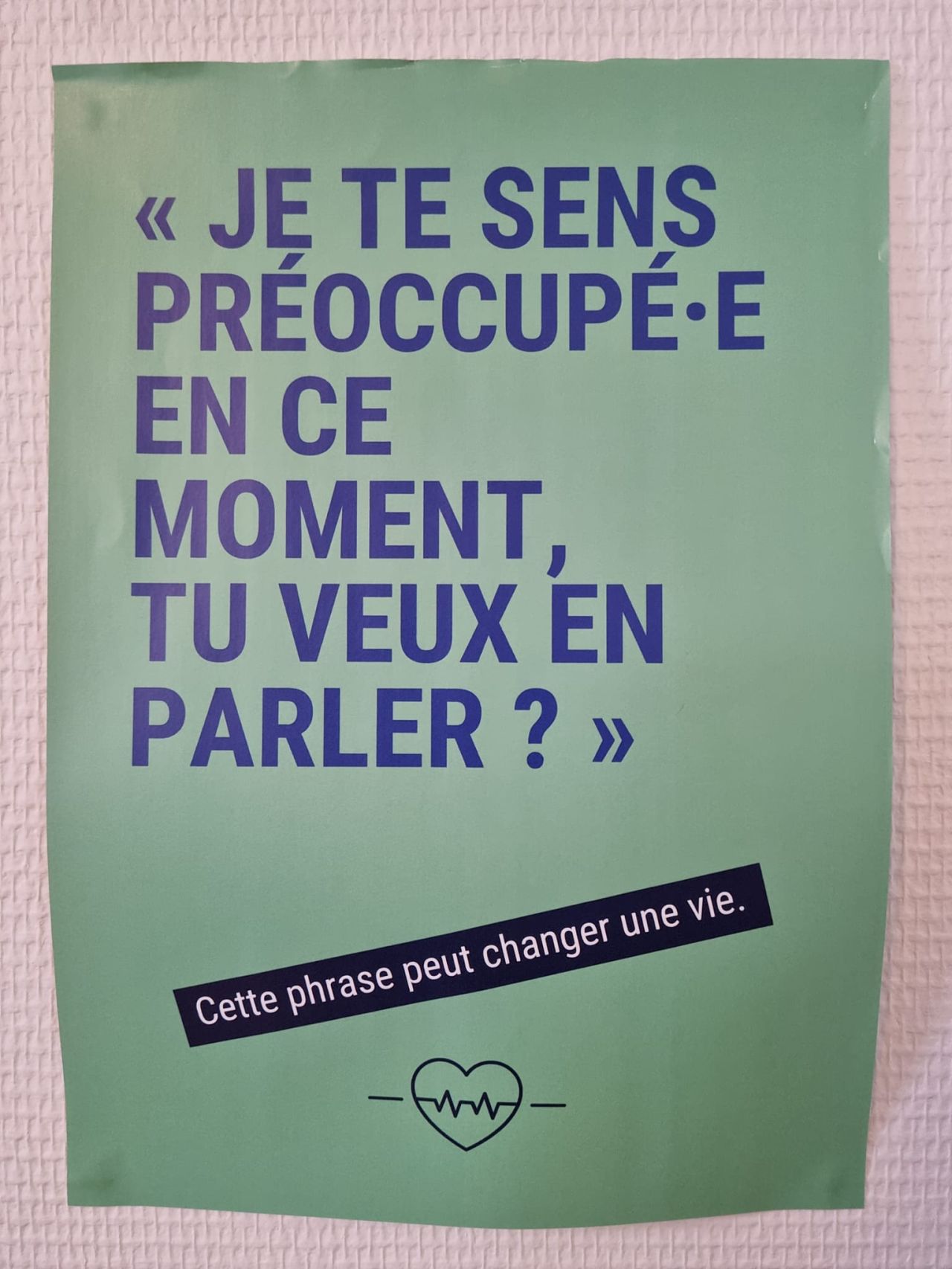
For this, the training FIRST AID IN MENTAL HEALTH FRANCE (PSSM FRANCE) allows in 2 days to address the main manifestations of mental suffering by giving an etiological and psychopathological reading, to receive tools to face them and to practice situations.
I can only recommend this training.
Perhaps you are wondering what motivates a psychologist to take mainstream training? There are not 1 but 4:
. technical knowledge deployed in the long time and a dedicated framework is not a daily skill implemented in the snapshot and informal places,
. MHFA is based on a protocol that allows for a structured approach to benefit the individual,
. To become a First Aid Health Trainer, you must have completed this first level, and finally
. Never lose a good opportunity for meaningful mental health training!
And to convince you, if necessary, of the interest of this citizen training that helps to destigmatization, we had the honors of France Info and yours truly to be, for a report that summarizes and perfectly embodies the content of these 2 days (link to France Info report).
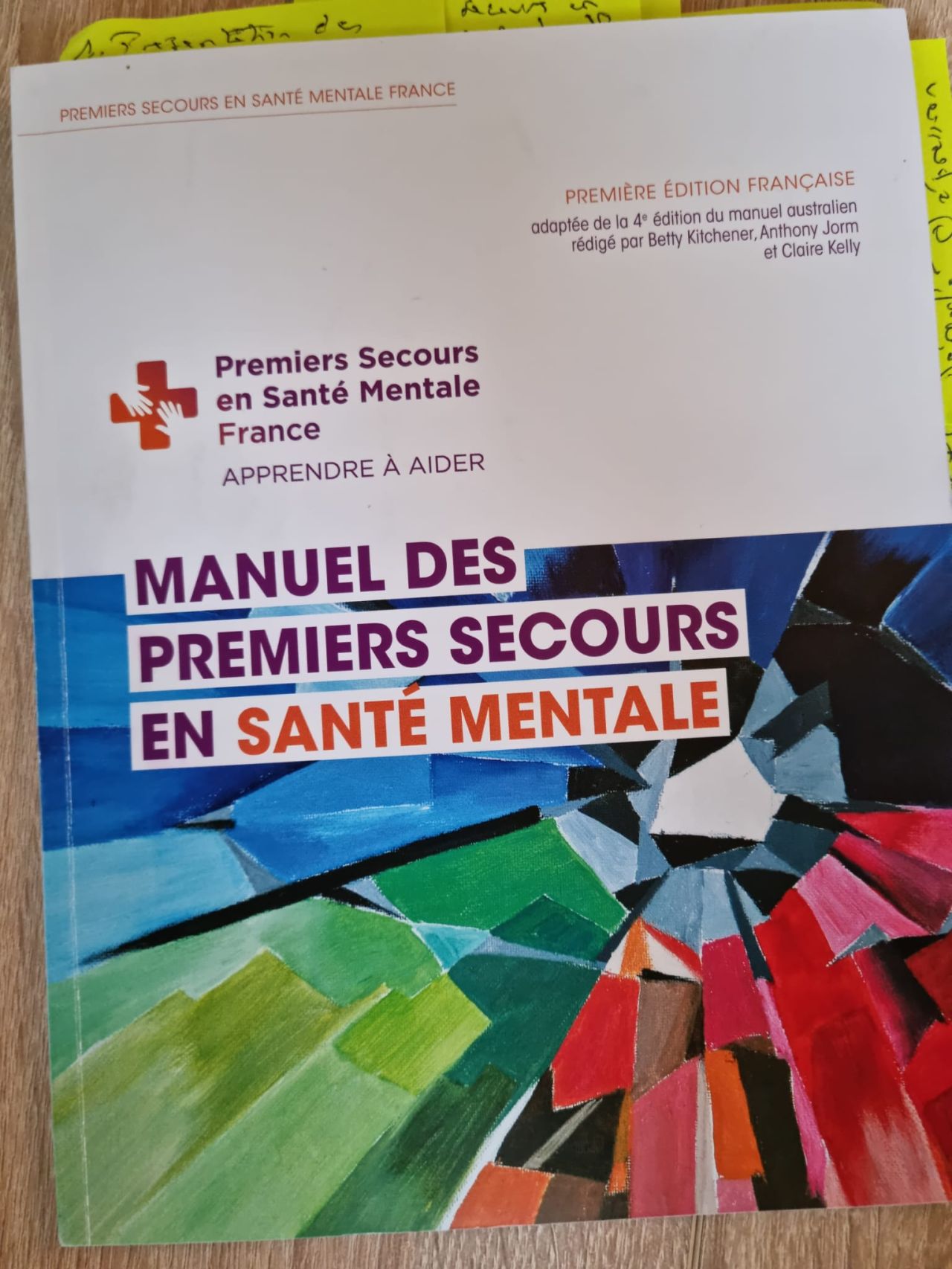
Mental Health First Aid training

If I say first-aider, who comes to mind? Probably firefighters, sea and mountain rescuers, paramedics, natural disaster responders, and many others.
And for the mind, who comes to mind? If you can’t see, then it could be you.
Because when faced with a relative, friend or colleague, one sentence can make a difference, can save a life. Reaching out with simple words like “I’m worried about you. I’m here if you want to talk about it” can open a door, rekindle trust, recreate a bond, and get someone to talk about the source of their malaise and the ideas, sometimes very dark, that this has created within them. However, when faced with situations in which they perceive the other person to be unwell, people are often at a loss and at best don’t know how to deal with it, or at worst think it’s better to leave the other person ‘alone’. So it’s important to learn to take this step, to dare to approach the other person, to dare to talk about potential suicidal thoughts.

For this, the training FIRST AID IN MENTAL HEALTH FRANCE (PSSM FRANCE) allows in 2 days to address the main manifestations of mental suffering by giving an etiological and psychopathological reading, to receive tools to face them and to practice situations.
I can only recommend this training.
Perhaps you are wondering what motivates a psychologist to take mainstream training? There are not 1 but 4:
. technical knowledge deployed in the long time and a dedicated framework is not a daily skill implemented in the snapshot and informal places,
. MHFA is based on a protocol that allows for a structured approach to benefit the individual,
. To become a First Aid Health Trainer, you must have completed this first level, and finally
. Never lose a good opportunity for meaningful mental health training!
And to convince you, if necessary, of the interest of this citizen training that helps to destigmatization, we had the honors of France Info and yours truly to be, for a report that summarizes and perfectly embodies the content of these 2 days (link to France Info report).

Participation in the conference "Reopening Transcarpathy" in Ukraine
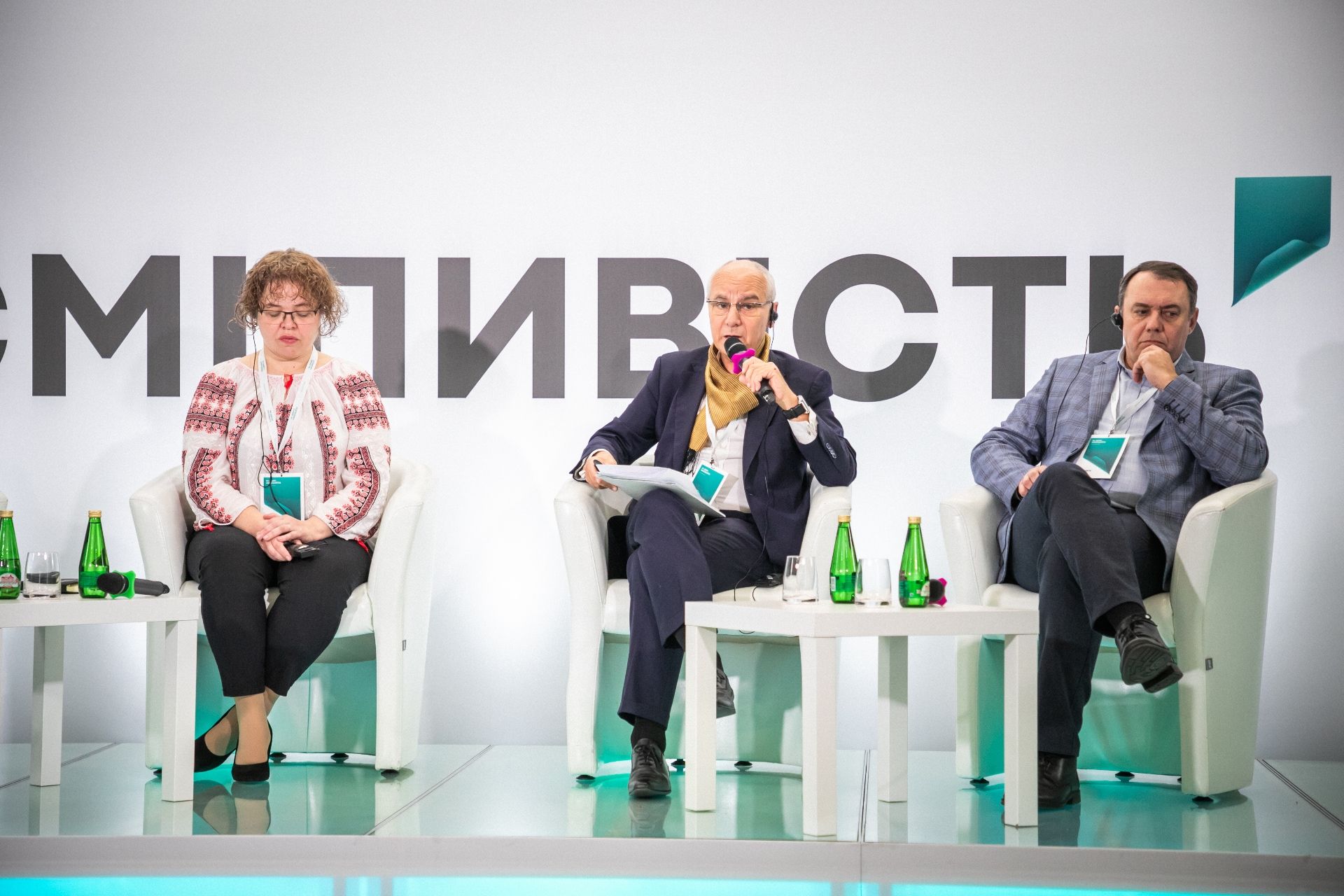
After a poignant opening by Oleksandra Matviychuk, whose NGO Centre for Civil Liberties received the Nobel Peace Prize in 2022, the Re:open Zakarpattia (“Reopening Transcarpathy”) conference, held in mid-November near Oujgorod, addressed major themes for this western region of Ukraine: reception of IDPs, wartime economy, reconstruction solutions, role in the construction of a future Central Europe.

During a session on mental health and psychosocial support, facilitated by Nataliya Kabatsii, Director of the Medical Aid Committee, I was able to present community mental health solutions and the importance of not stigmatizing or leaving someone out of psychological care.
An informal roundtable, held on the sidelines of the conference with organizers and stakeholders (psychiatrist, academic..), laid the foundations for a future conference specifically dedicated to the development of mental health and psychosocial support in Transcarpathy and Ukraine, a particularly stimulating project !
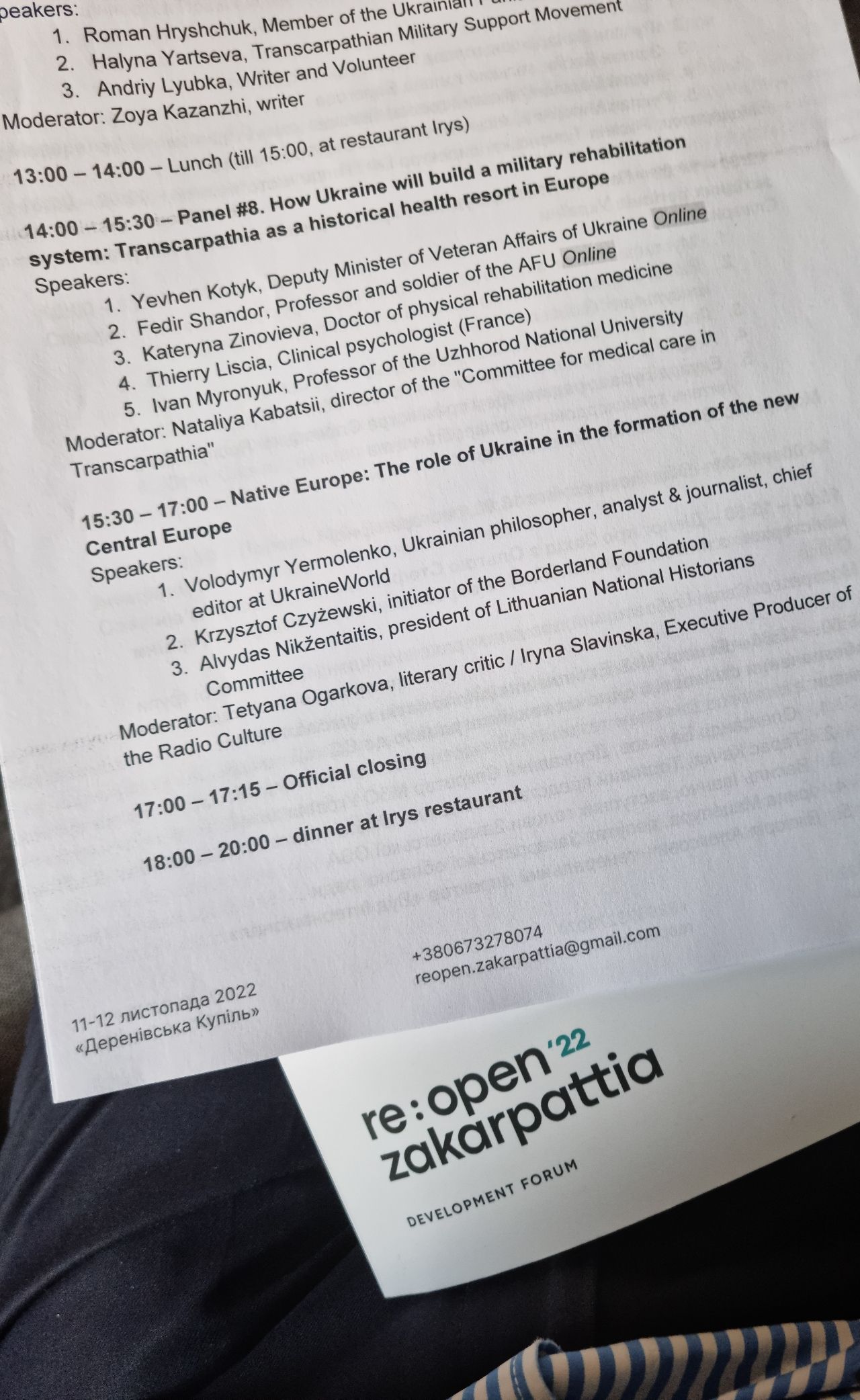
Participation in the conference "Reopening Transcarpathy" in Ukraine

After a poignant opening by Oleksandra Matviychuk, whose NGO Centre for Civil Liberties received the Nobel Peace Prize in 2022, the Re:open Zakarpattia (“Reopening Transcarpathy”) conference, held in mid-November near Oujgorod, addressed major themes for this western region of Ukraine: reception of IDPs, wartime economy, reconstruction solutions, role in the construction of a future Central Europe.

During a session on mental health and psychosocial support, facilitated by Nataliya Kabatsii, Director of the Medical Aid Committee, I was able to present community mental health solutions and the importance of not stigmatizing or leaving someone out of psychological care.
An informal roundtable, held on the sidelines of the conference with organizers and stakeholders (psychiatrist, academic..), laid the foundations for a future conference specifically dedicated to the development of mental health and psychosocial support in Transcarpathy and Ukraine, a particularly stimulating project !

First strategic seminar of the Ukraine Solidarity Committee of the Fondation de France
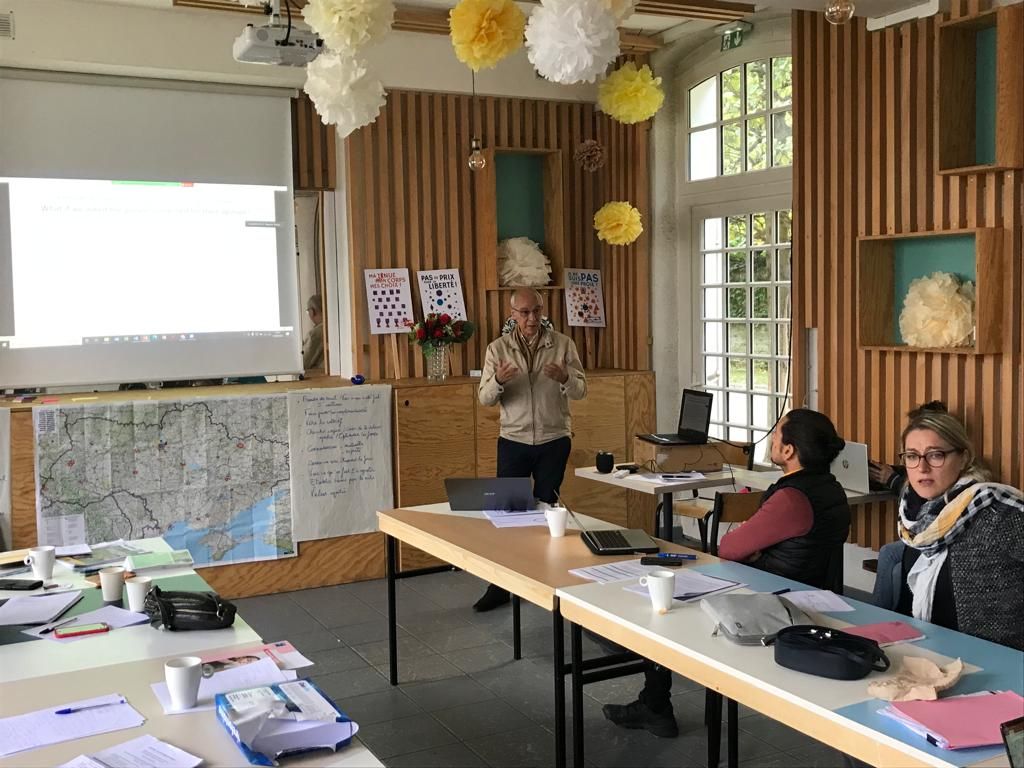
As it did after the earthquakes in Haiti and Nepal, or after the explosion at the port of Beirut, the Fondation de France (FdF) launched a call for donations for the crisis in Ukraine, and has raised 17 million euros to date. These funds are allocated to projects after analysis of applications by a committee composed of volunteers and specially constituted.
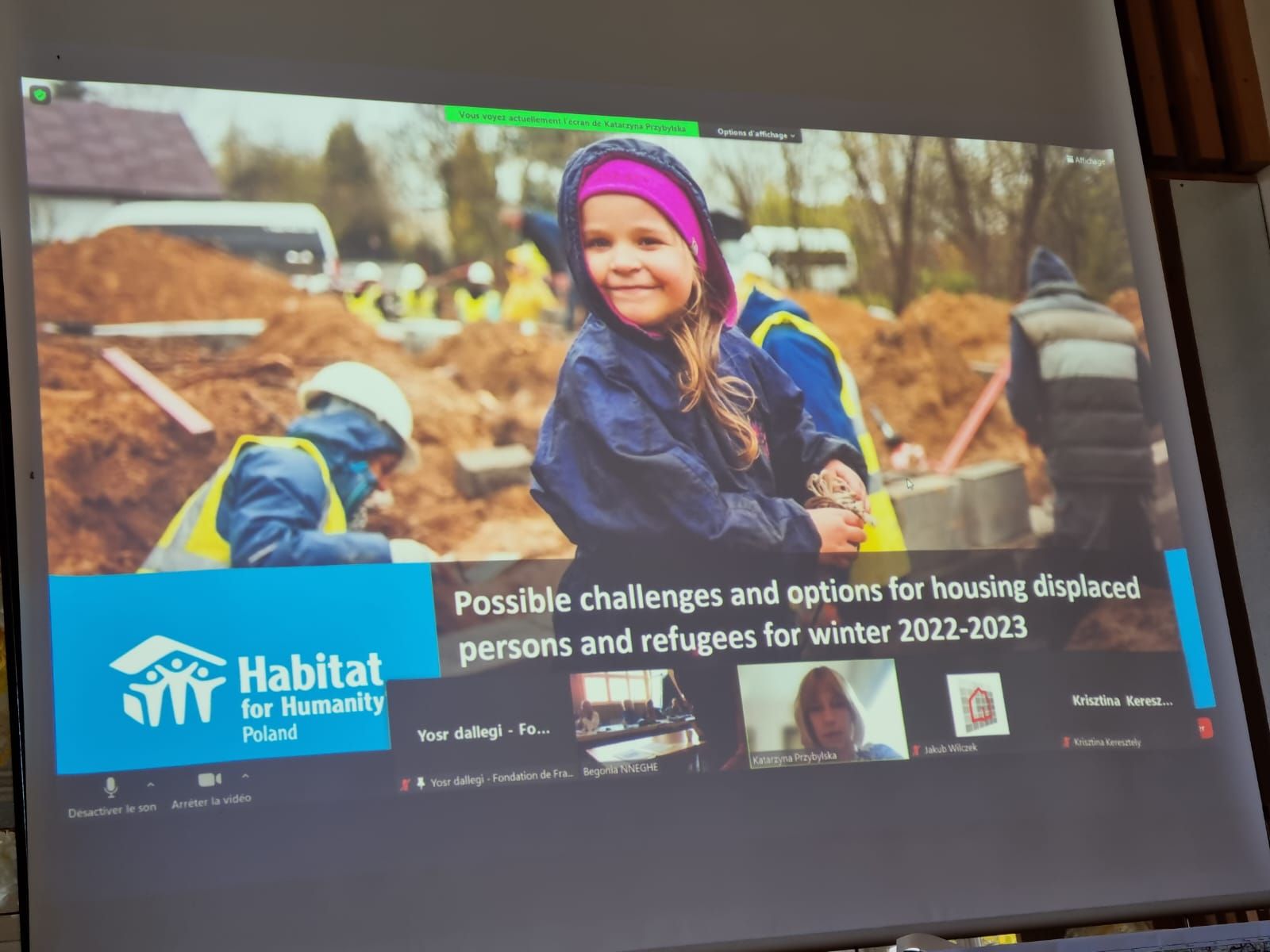
This seminar thus made it possible to dialogue with resource persons who are on the front line on crisis management in Ukraine and Poland; to deal, among others, possible issues and options for the accommodation of displaced persons and refugees for the winter or the main human rights violations in the region and priorities to be addressed; and to continue reflection on the best possible allocation of funds.
A session on mental health, which I facilitated with the support of colleagues on the committee, opened up avenues for better management of this central topic in view of the superposition and complexity of trauma suffered.
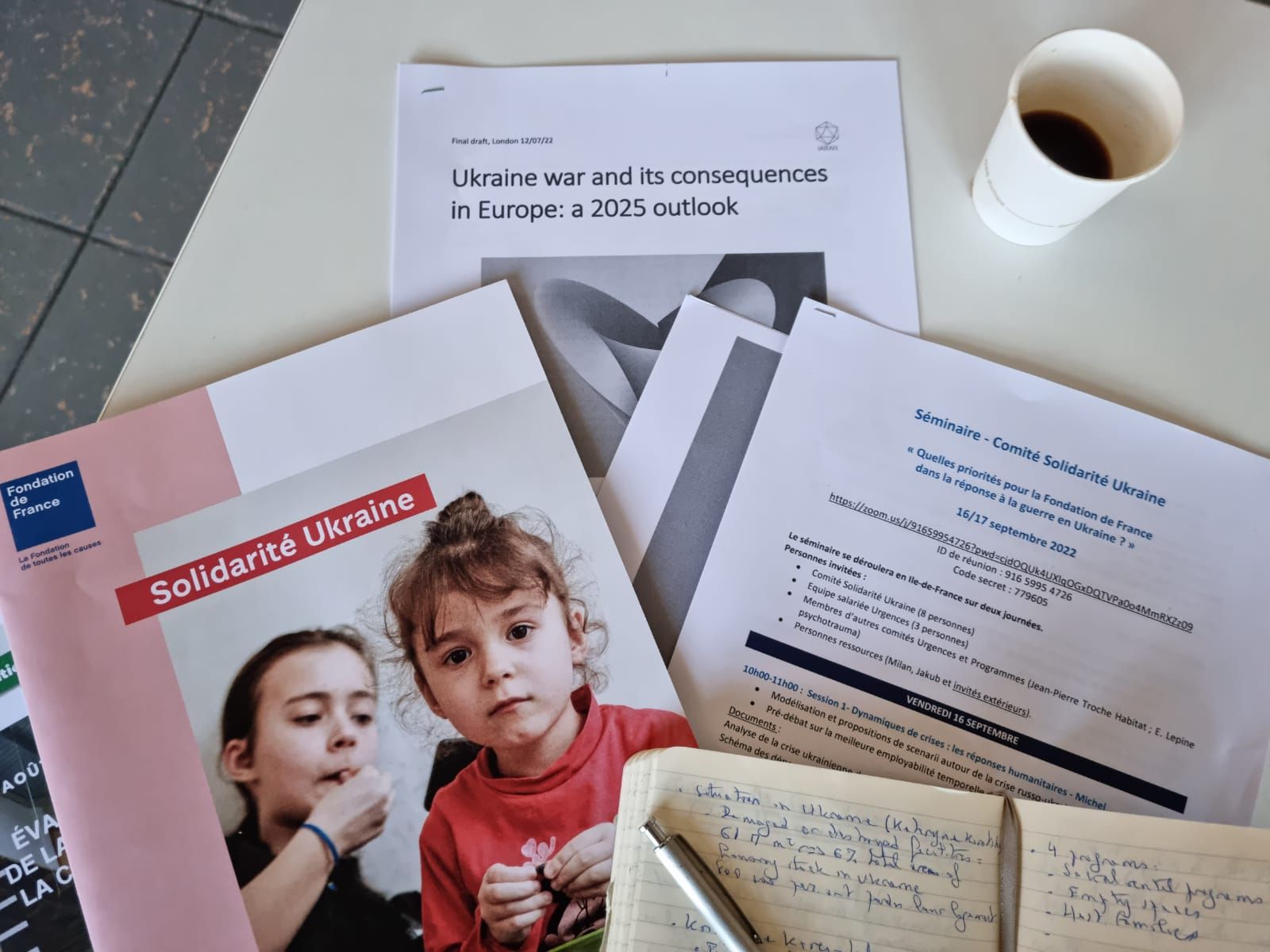
On arrival, stimulating debates, an even more united collective, and keys to make our response ever closer to needs, all at La Maison Montreau in Montreuil, a third place as we like them, between welcoming team, pleasant rooms and dishes prepared by Baluchon, social enterprise approved insertion company: a good address for your seminars in the east of Paris!

First strategic seminar of the Ukraine Solidarity Committee of the Fondation de France

As it did after the earthquakes in Haiti and Nepal, or after the explosion at the port of Beirut, the Fondation de France (FdF) launched a call for donations for the crisis in Ukraine, and has raised 17 million euros to date. These funds are allocated to projects after analysis of applications by a committee composed of volunteers and specially constituted.

This seminar thus made it possible to dialogue with resource persons who are on the front line on crisis management in Ukraine and Poland; to deal, among others, possible issues and options for the accommodation of displaced persons and refugees for the winter or the main human rights violations in the region and priorities to be addressed; and to continue reflection on the best possible allocation of funds.
A session on mental health, which I facilitated with the support of colleagues on the committee, opened up avenues for better management of this central topic in view of the superposition and complexity of trauma suffered.

On arrival, stimulating debates, an even more united collective, and keys to make our response ever closer to needs, all at La Maison Montreau in Montreuil, a third place as we like them, between welcoming team, pleasant rooms and dishes prepared by Baluchon, social enterprise approved insertion company: a good address for your seminars in the east of Paris!

Mission to Moldova
From April 13 to 17, 2022, I went to Moldova, as part of my role as mental health advisor for the Ukraine committee of the Fondation de France. The mission was carried out jointly with the French Development Agency, with which the Fondation de France is currently drawing up a partnership agreement, like what was done for Lebanon after the explosion at the port of Beirut.
The main lessons of this mission are:
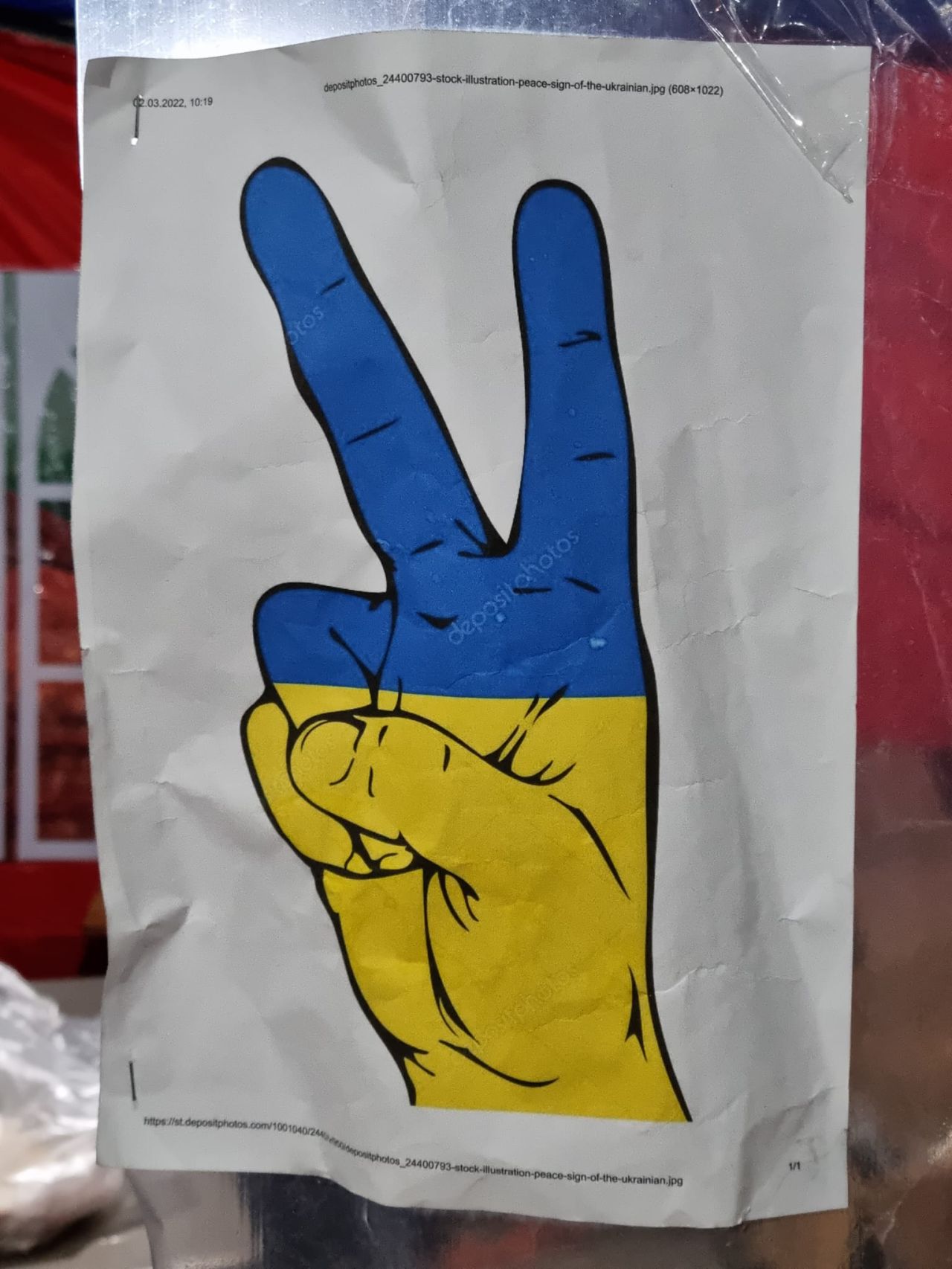
Moldova, April 2022.
Photo : Th Liscia
Mobilization of civil society and the Moldovan authorities: 400,000 refugees welcomed, 100,000 still present on the territory all housed and supported.
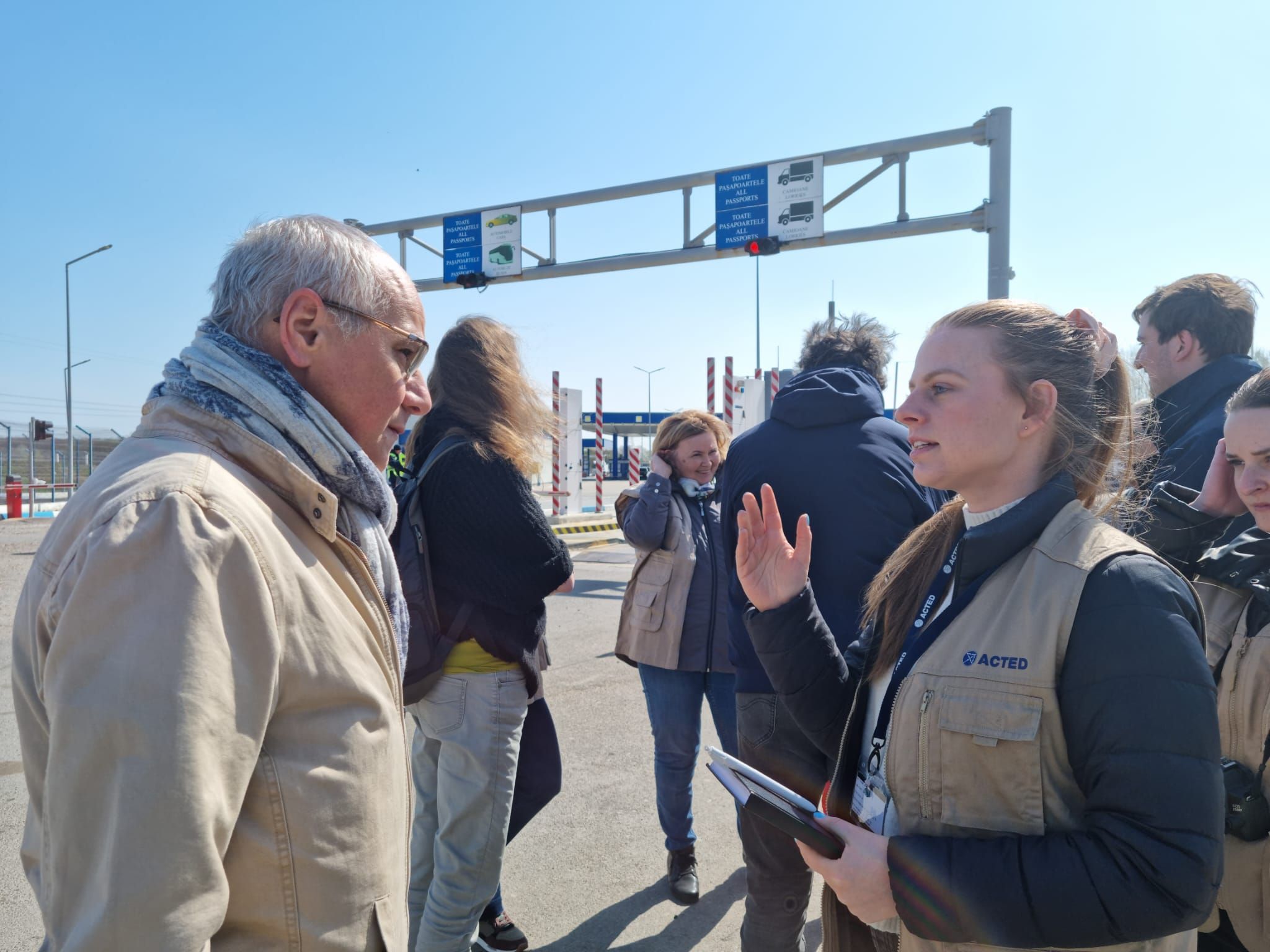
Border Moldova – Ukraine, April 2022.
Photo : anonymous

Donation storage warehouse in Chisinau,
April 2022. Credit : Th Liscia
The repetition of the negative consequences of certain actions in times of crisis: the Moldovan administrations dispossessed of their best elements by the recruitment of UN organizations, the excess of accumulated donations that will either not be used or destabilize the local economy in part.
The emerging needs of psychological support in relation to guarantees of moral appeasement (necessarily relative), such as the ability to be connected with the family remaining in Ukraine, being a refugee in a country where mental health care is not organized to deal with this type of situation.
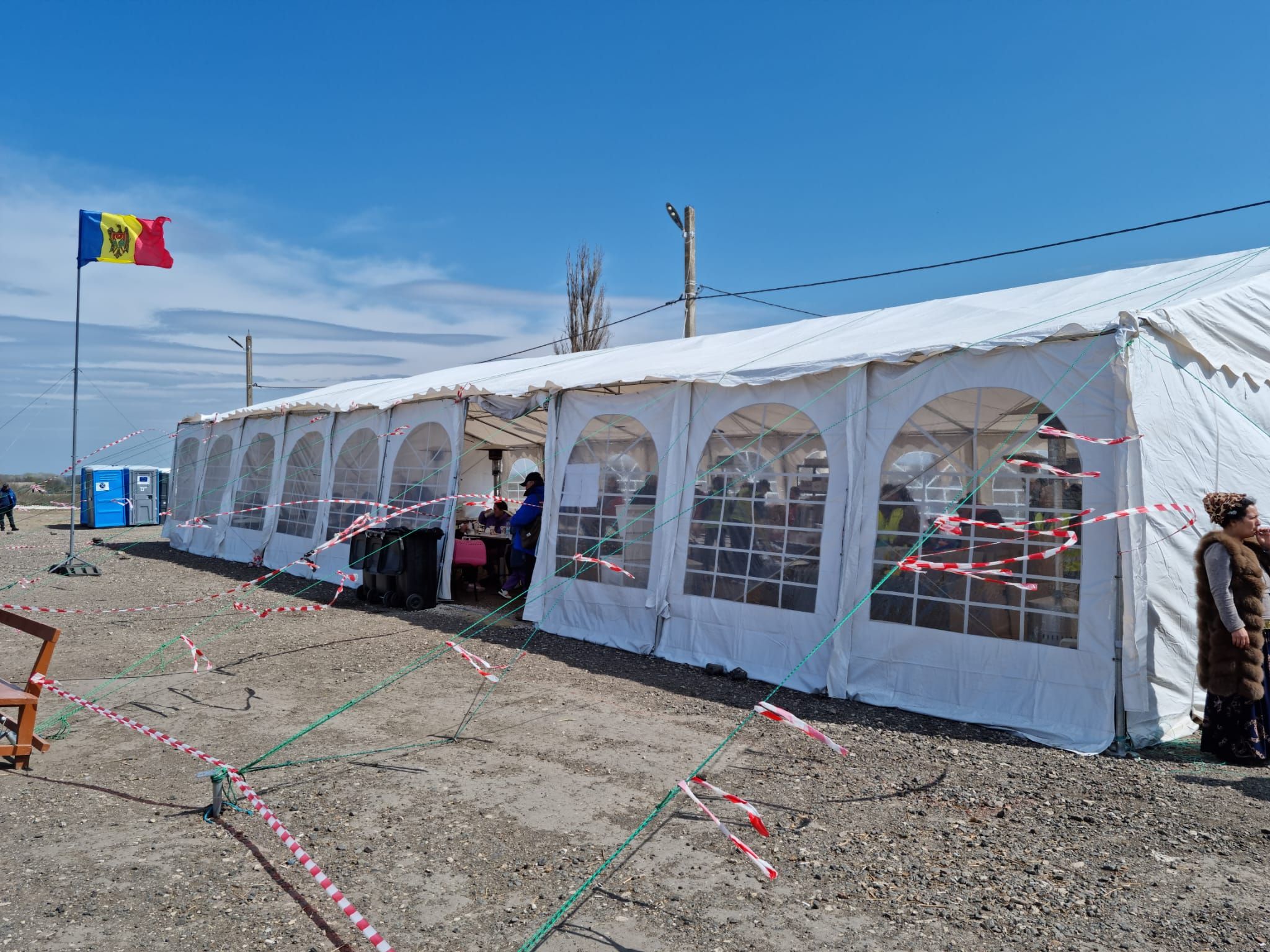
Dining and rest area at the entrance
in Moldova, April 2022. Credit: Th Liscia

Moldova Entry First Aid and Care Area, April 2022. Photo: Th Liscia
The call for projects of the Fondation de France can be consulted on the website of the Fondation de France.
The first projects financed here.
Mission to Moldova
From April 13 to 17, 2022, I went to Moldova, as part of my role as mental health advisor for the Ukraine committee of the Fondation de France. The mission was carried out jointly with the French Development Agency, with which the Fondation de France is currently drawing up a partnership agreement, like what was done for Lebanon after the explosion at the port of Beirut.
The main lessons of this mission are:
Mobilization of civil society and the Moldovan authorities: 400,000 refugees welcomed, 100,000 still present on the territory all housed and supported.

- The work of NGOs mobilized in record time, with a special mention for the ACTED teams and their work at the border.

The repetition of the negative consequences of certain actions in times of crisis: the Moldovan administrations dispossessed of their best elements by the recruitment of UN organizations, the excess of accumulated donations that will either not be used or destabilize the local economy in part.

- The emerging needs of psychological support in relation to guarantees of moral appeasement (necessarily relative), such as the ability to be connected with the family remaining in Ukraine, being a refugee in a country where mental health care is not organized to deal with this type of situation.


The call for projects of the Fondation de France can be consulted on the website of the Fondation de France.
The first projects financed here.
EMDR Training
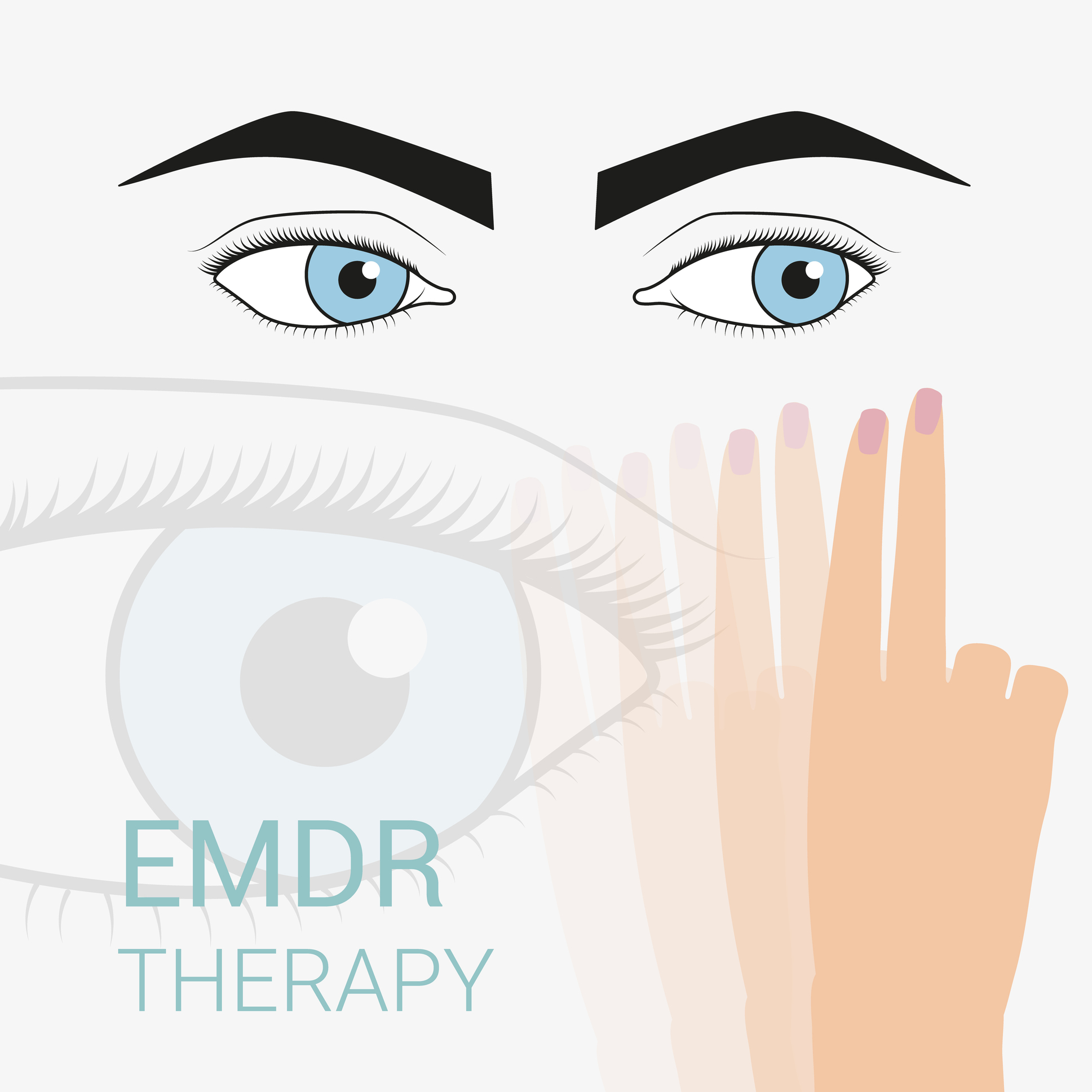
From 26 to 29 January 2022, I was trained at EMDR level 1 (Eye Monitoring Desensitization and Reprocessing).
- psychotraumatology
- neuroplasticity of the brain
- validation of the effectiveness of the model by scientific research
- the 8 phases of the EMDR protocol
- practical situations
Information about EMDR therapy can be found on this site on the Useful Links page.
EMDR Training

From 26 to 29 January 2022, I was trained at EMDR level 1 (Eye Monitoring Desensitization and Reprocessing).
- psychotraumatology
- neuroplasticity of the brain
- validation of the effectiveness of the model by scientific research
- the 8 phases of the EMDR protocol
- practical situations
Information about EMDR therapy can be found on this site on the Useful Links page.
Hearing by the National Assembly

As part of the information mission, the National Assembly, on national resilience, which aimed to analyze the main risks and threats to the country and assess the capacity of institutions, I had the honour of being invited to the hearing on the psychological consequences of large-scale crises. This round table, led by the deputy Thomas Gassilloud, rapporteur of the mission, and which also brought together Dr Patrice Louville, psychiatrist of hospitals, and Pr Francis Eustache, Neuropsychologist, has addressed various topics including research conducted in the development of post-traumatic stress disorder, the consequences of long-term exposure to a complex adverse situation, and to formulate recommendations for the Government’s action in the event of combined crises.
My intervention was part of the final section of the mission’s argument regarding «how people are reacting today to tragedies in other parts of the world», leading me to present three types of work from my career that may be of interest to the mission: an in-depth study on the treatment of the psychological trauma of populations in countries in crisis, following conflict or a natural disaster; in Lebanon, the AFD project to create community mental health centers in the Beqaa and Rafiq Hariri Hospital in Beirut; psychological support post traumatic events for people following the 1st attack in downtown Ouagadougou in January 2016, and the explosion at the port of Beirut in August 2020.
For those interested, the hearing can be viewed from 1:19 am on the National Assembly website.
The information report can be consulted on the website of the National Assembly.
Hearing by the National Assembly

As part of the information mission, the National Assembly, on national resilience, which aimed to analyze the main risks and threats to the country and assess the capacity of institutions, I had the honour of being invited to the hearing on the psychological consequences of large-scale crises. This round table, led by the deputy Thomas Gassilloud, rapporteur of the mission, and which also brought together Dr Patrice Louville, psychiatrist of hospitals, and Pr Francis Eustache, Neuropsychologist, has addressed various topics including research conducted in the development of post-traumatic stress disorder, the consequences of long-term exposure to a complex adverse situation, and to formulate recommendations for the Government’s action in the event of combined crises.
My intervention was part of the final section of the mission’s argument regarding «how people are reacting today to tragedies in other parts of the world», leading me to present three types of work from my career that may be of interest to the mission: an in-depth study on the treatment of the psychological trauma of populations in countries in crisis, following conflict or a natural disaster; in Lebanon, the AFD project to create community mental health centers in the Beqaa and Rafiq Hariri Hospital in Beirut; psychological support post traumatic events for people following the 1st attack in downtown Ouagadougou in January 2016, and the explosion at the port of Beirut in August 2020.
For those interested, the hearing can be viewed from 1:19 am on the National Assembly website.
The information report can be consulted on the website of the National Assembly.
